- Home
- Rebecca Lim
Afterlight
Afterlight Read online
PRAISE FOR REBECCA LIM
‘The Astrologer’s Daughter is compulsively readable. Avicenna is a captivating hero—tough yet vulnerable. This gritty and mysterious love story will stay with me for a long time.’ Cath Crowley
‘Smart and original—a beautifully written mash-up of mystery, thriller and love story.’ Vikki Wakefield
‘[Lim’s] taut, assured thriller weaves together astrology and mythology, poetry and poverty…Teen and adult readers who like their mysteries gritty and literary, with a touch of magic: seek this one out.’ Kirkus Reviews (Starred)
‘A perfect balance of wit, humour, willpower and raw emotion.’ Dolly
‘The best aspect of this novel was Avicenna herself… a captivating combination of brazen and terrified.’ Launceston Examiner
‘Subtly beautiful and utterly intriguing, Rebecca Lim’s Mercy series brims with mystery and romance that pulls readers through the veil between worlds real and mythical.’ Andrea Cremer, New York Times-bestselling author of The Nightshade Series
‘Gripping. By the end, you can’t help but wonder who this angel of Mercy will become next.’ Sunday Herald Sun
‘What is compelling about this novel is not only its tightly constructed plot but the lyrical quality of the writing… Not to be missed.’ Reading Time
Rebecca Lim is a writer and illustrator based in Melbourne, Australia. She worked as a commercial lawyer for several years before leaving to write full time. Rebecca is the author of sixteen books for children and young adult readers, including The Astrologer’s Daughter. An Aurealis Awards finalist, Rebecca’s work has been longlisted for the Davitt Award for YA, the Gold Inky Award and the CBCA Book of the Year Award for Older Readers. Her novels have been translated into German, French, Turkish, Portuguese and Polish.
textpublishing.com.au
The Text Publishing Company
Swann House
22 William Street
Melbourne Victoria 3000
Australia
Copyright © Rebecca Lim 2015
The moral rights of Rebecca Lim have been asserted.
All rights reserved. Without limiting the rights under copyright above, no part of this publication shall be reproduced, stored in or introduced into a retrieval system, or transmitted in any form or by any means (electronic, mechanical, photocopying, recording or otherwise), without the prior permission of both the copyright owner and the publisher of this book.
First published in 2015 by The Text Publishing Company
Cover and page design by Imogen Stubbs
Cover photographs: hand © Lia & Fahad / Stocksy United,
face © Maja Topčagić / Stocksy United
Typeset by J&M Typesetting
National Library of Australia Cataloguing-in-Publication entry:
Author: Lim, Rebecca (Rebecca Pec Ca), 1972-
Title: Afterlight / by Rebecca Lim.
ISBN: 9781925240498 (paperback)
ISBN: 9781922253255 (ebook)
Dewey Number: A823.4
This project has been assisted by the Commonwealth Government through the Australia Council, its arts funding and advisory body.
To the people in my lifeboat:
Michael, Oscar, Leni and Yve.
With love always.
I have been one acquainted with the night.
I have walked out in rain—and back in rain.
I have outwalked the furthest city light.
ROBERT FROST (1928)
Contents
CHAPTER 1
CHAPTER 2
CHAPTER 3
CHAPTER 4
CHAPTER 5
CHAPTER 6
CHAPTER 7
CHAPTER 8
CHAPTER 9
CHAPTER 10
CHAPTER 11
CHAPTER 12
CHAPTER 13
CHAPTER 14
CHAPTER 15
CHAPTER 16
CHAPTER 17
CHAPTER 18
ACKNOWLEDGMENTS
1
I used to believe in ghosts.
I saw something, once. It’s not anything I’ve ever shared with anyone. I was little and he was real and it was dark and he only stood over me that one time when I was, maybe, five?
A tall man with a mass of long, pale hair, tied into a ragged plait. Sinewy and broad-shouldered, wearing a plaid shirt, jeans and boots. Heavy chains of silver at his throat and on his wrists. I could see all that, even with the light out.
But he was real. Real as you. And I was terrified. But all he did was look down at me, lying with my blankets pulled right up to my eyes, looking back up at him.
Then I breathed in—just a trembly, choky flutter, the tiniest sound—and he was gone.
But I don’t believe, not anymore. Because if ghosts were real, Mum and Dad would have found a way—some way—to make it back to me. They promised me they’d always be there. There wasn’t a day when they didn’t say they loved me and we’d grow old together and they’d be there to look after all my babies while I took on the world, because the world was my oyster, I could be anything and do anything, I was better than them—which, based on my track record with boys and school, was never going to happen.
But they were optimists. It used to disgust me how much they looked on the bright side of life because before I came along, they said, life had never been bright. It had been hopeless. But I’d saved them. That was the word Mum had used: Saved.
They’d been through the wars, Dad used to remark. Which means that me and your Mum are gonna live forever, Sophie. You’ll never be rid of us.
So when they were T-boned on the way up to Gippsland on Dad’s Harley—taken out by an off-his-face random driving a stolen car—I expected…something. A miracle. At least a sign. Just a Yoo hoo, love, we’re okay.
But there was no sign. Just a couple of matching white coffins a few days later, and a wake at my Grandma’s pub that lasted for three days. Big bruisers in tatts and leather and Cuban-heeled boots from all over the country with names like Flasher and Fat Arse coming up to me all beery-breathed and teary-eyed, putting their meaty hands on my shoulders and giving them a squeeze, saying, ‘Brother-in-arms, good man, the best.’
They were, though—the best dad and mum in the world, Joss and Angel. More like a couple of daggy, embarrassing friends than parents. No expectations, no bullshit; all love. And then, just like that—because of an old-times-sake Sunday motor up to the Lakes for a feel of the wind in their hair—the world no longer contained them.
Around here, we’ve always been those Teagues who live down the pub.
So after Dad and Mum died, I just kept on living at Gran’s place—The Star Hotel—the way I’ve always lived there. Life involved the same bedroom, the same clothes, the same school and the same pervasive smell of beer. Only, someone had taken a God-sized eraser to part of it. They were taken from me in the November before my final year
was due to kick off. They died before I’d finally be old enough to vote or drink. It felt like the cruellest, most irreversible joke.
It also felt unreal for the first few months. Like I’d open the storeroom door and Dad might be standing there with his back to me, stacking bulk lots of toilet rolls. Or I’d take out the garbage and somehow catch Mum sneaking a cigarette in the laneway behind the pub.
It made me a little crazy. I’d sit for hours inside the built-in wardrobe in their bedroom, just so that the air would smell of them. I’d talk to complete strangers at random hoping they’d ask me how I was and then spring my tragic story on them only to watch those same people run away in horror. I cried in public places and walked the streets around The Star after dark, practically begging to be murdered because the dark was where they were; they were nowhere in the light.
For a while, I convinced myself they were just on the round-the-world cruise Mum had always wanted to go on—only they’d forgotten to send me postcards. And craziest of all? I walked up to Floyd Parker the first week that school was back and kissed him on the mouth in front of actual witnesses, for seconds that felt like hours. I had a death wish, obviously. Life was short, it had been proven, and if I never did it, I’d never do it. Now, now was the time. There was nothing left to lose.
Stick legs and hair, that’s what I was known for. Hair like that L’Oreal bird, the old one, not Beyoncé or Eva or Doutzen. A curly, ginger cloud, so thick and crazy it looked too big for my head. And freckles—I only had to step out into the light for a new infestation to start somewhere. I was already 183.5 centimetres without shoes on and in possession of hair-trigger blood vessels in the face. No meat on me to speak of. All bones and angles.
So I deserved the ensuing hilarity. Floyd Parker had lived across the road, six doors down, for years and years. We’d even walked in to school together; I couldn’t count how many times. But he’d never shown me anything other than benevolent disinterest, a fact I recklessly disregarded when I pulled him to me. He was hot—only growing hotter—and I was a mess. What I’d done was completely mental. Like a lemming, I’d thrown myself at him and he’d side-stepped and let me go over the cliff.
‘The way he recoiled, Soph,’ someone hooted later, ‘was a classic.’
Just like with death, you can never go back after something like that. In the panicky days after, when I started skipping class and stopped taking the calls of anyone I ever knew from my old life—I somehow convinced Gran to let me change schools just so I’d never have to look Floyd Parker in the eye again.
It’s the start of final year, I’d begged. You don’t want me to stuff it up any more than it’s already been stuffed, do you?
I’d been watching the evening news with Gran when I broached the subject—the lead story about some terrible shooting that had taken place that day at a city intersection. Some outlaw motorcycle gang leader with a neck almost as wide as his shoulders had shot an innocent bystander to death when he intervened in a domestic the psycho was having with his on-off girlfriend. A backpacker got hurt, too, plus a woman who was in a car at the lights. The bikie was still on the run. It was unclear what had happened to the girlfriend.
Her photo had lingered for a moment on screen. ‘She looks just like your mother,’ Gran had whispered, her fork frozen halfway to her mouth. ‘Same long, dark hair, pale skin; beautiful. Could be your mother. It’s uncanny. And the gunman was a Reaver, just like your dad was once. The great untouchable O’Loughlin himself. Haven’t heard that name in years. What are the chances?’
I’d registered the coincidences dully. The girl in the mug shot—staring up and out of her long hair, wary, like something cornered—looked more my age than Mum’s. But they could have been sisters, yeah. And the fact that a bikie and a dancer were involved was eerie.
‘Like history repeating itself,’ I’d mumbled, swallowing. ‘Only Dad was no psycho, Gran. He got Mum out of the business the same way he got himself out. And I never heard them argue. Not once. He would sooner have turned a gun on himself, than on Mum. She was his life.’
Seconds later, I’d placed my fork down on the plate balanced on my lap overwhelmed by sorrow: Mum, Dad, Floyd. Nothing left to live for. ‘I am destroyed,’ I whispered, head in my hands, the tears dripping down into the mash, the untouched bean salsa.
‘A fresh start, Sophie,’ Gran had agreed finally—freaked out just as much by my behaviour as by the news story, but trying not to show it as she got up to take our plates back to the kitchen before the night shift began—‘might be just what you need.’
So I found myself at Ivy Street High two Mondays later. It was just a twenty-minute walk from my old school, a simple detour, nothing really, but it could have been a different country I was crossing into because no one knew my story.
They’d all just stared and stared at me going up and up and up when I’d walked in the gates on my first day. A freak who blocked out the sun. Tallest girl there by miles.
‘Sure you don’t want the technical institute, Storkie?’ a guy had drawled as I fetched up at the door of the special common room for final year students. I’d stood there looking lopsided in my second-hand, bile-yellow and navy uniform, ginger hair as fat as a fox tail hanging over one shoulder, trying to gauge the tribal connections, too green to see the pattern of how they all fitted in.
And I’d done that thing I hate about myself, which involves most of the blood in my body making a sudden leap for my neck, then my face, then my scalp, like a live thing running for cover in my hair. Blushing doesn’t even begin to describe what happens when I get embarrassed. Everyone had laughed while I’d kicked at the carpet, my face on flaming fire, and that was how it was from then on. Open season on tall jokes.
But I’d survived my first day, talking to nobody, smiling gamely into the middle distance, assiduously avoiding the three girls people kept pointing out to me as the toughest bitches at Ivy Street. It was enough, I told myself over and over, that I’d never have to walk past Floyd Parker’s house again. I could do this. Nine months more and even school would be a distant memory. I wasn’t dumb, exactly. But school and I had just never rubbed along. We’d just never gotten each other and I was glad to be just about out the back end of it.
After that first day, Storkie stuck. It didn’t matter that I was Sophie Teague any more, the girl with the two dead parents. At Ivy Street High, I was a clean skin. New game; new rules. Play on.
Then, as I was lying in bed that very night, listening to public radio in the dark—someone’s idea of a dirty garage, Ramones tribute band—the room suddenly began to smell of some old-fashioned flowery perfume and she was bending over me like I was a sick person in need of assistance.
The girl from the news. The missing stripper.
In my bedroom.
And I was five years old again, in the dark. Heart stopped, everything stopped.
She’d looked real and solid and solemn. A girl with a pale, unlined face who could have been my dead mother’s daughter she looked so much like her. I could tell all this, because the girl was outlined in a faint silvery light. Her hair was slightly wavy at the ends and she had a strong nose. Her lower lip was a little fuller than her upper one, and she was of just above average height. I could also see how, if she didn’t watch it, she’d run to fat one day with no
problems. But that right now, she was shaped like an extra busty hourglass—something guys like that I knew I would never be.
She wore a black tank top and black jeans, long hair hanging down loose, eyes like pieces of jet, long feet pale and bare. Beautiful, in a top-heavy, fleshy kind of way. Silent, just looking at me looking at her. Kind of illuminated from the inside, and in outline, like a freaking torch.
It felt like I was wide-awake in the dark for hours, literally suspended in place by terror. While for her, it probably felt like no time had passed at all. It was hard to get a handle on what she was thinking because her face never changed the whole time.
It was probably more of a reconnaissance manoeuvre, a scouting exercise, on her part. If I’d leapt out of bed and turned on all the lights, screamed at her to leave, or made the sign of the cross, hissed, spat, done anything, maybe she would’ve gone away and stayed away.
No prizes for guessing who just lay there, too scared even to blink, while she studied me like a painting for surface weaknesses, for flaws. She probably took one look at me and thought to herself, There’s my bitch. And that’s how it started.
2
So she came again, the next night, and the next, until I got what she wanted.
Eve. That was what I ended up calling her—I had to call her something, and she was sort of a bit biblical looking, and a bit evil, all at the same time.
Anyway, on the Tuesday afternoon, I’d been stacking trays of empties into the industrial dishwasher just to escape our resident pervert, Dirty Neil, who treated Gran’s Public Bar like it was his lounge room. He was long-term unemployed and had to be at least thirty-five—looking more like fifty-five because of all the beer and Bacardi he drank.
Watched you grow up, he said, like he always did as he took up position on his favourite bar stool, licking his lips while he said it. I hadn’t yet worked out what was creepier—the thought of him thinking he was good enough for me, or the thought of him thinking about me.

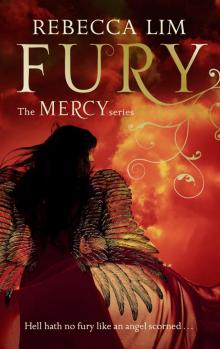 Mercy (4) – Fury
Mercy (4) – Fury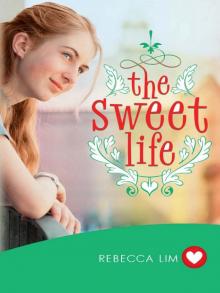 The Sweet Life
The Sweet Life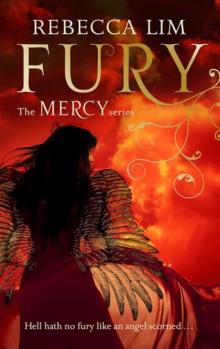 Fury m-4
Fury m-4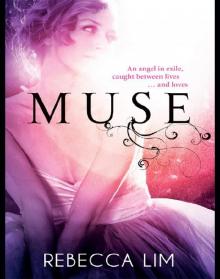 Muse
Muse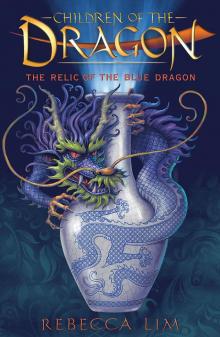 The Relic of the Blue Dragon
The Relic of the Blue Dragon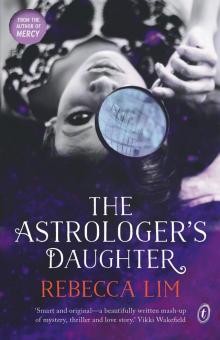 The Astrologer's Daughter
The Astrologer's Daughter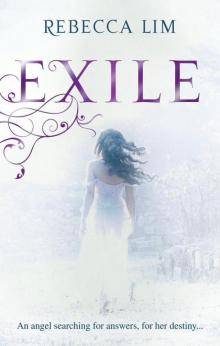 Mercy (2) — EXILE
Mercy (2) — EXILE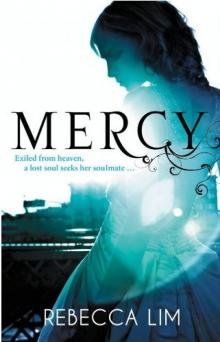 Mercy
Mercy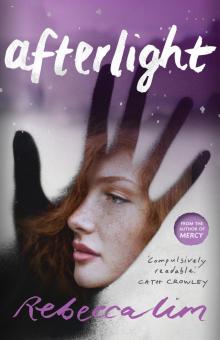 Afterlight
Afterlight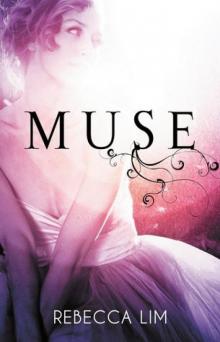 Muse m-3
Muse m-3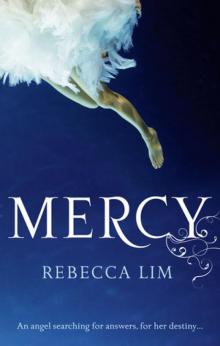 Mercy m-1
Mercy m-1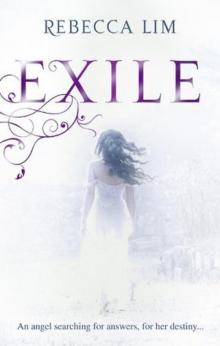 Exile m-2
Exile m-2